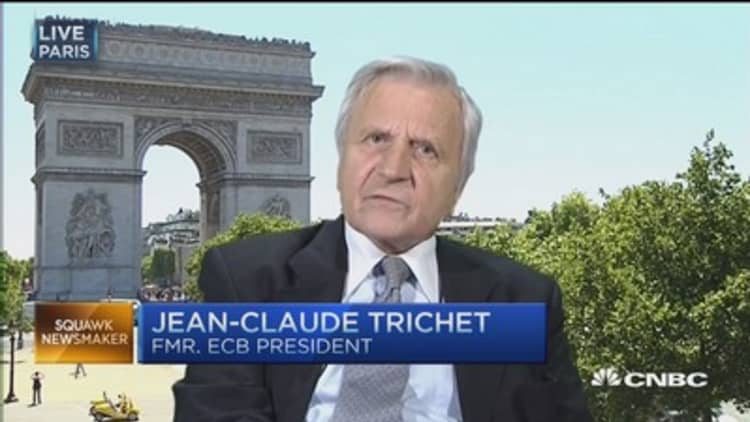


Former European Central Bank President Jean-Claude Trichet said Friday negotiators must remain cautious throughout discussions with Greece on its bailout, but the latest moves by Athens show the drama could end "fortunately."
"The new proposals that are made by the Greek government are demonstrating a real will to have an agreement," he told CNBC's "Squawk Box." "We will see. I remain very, very prudent myself, but clearly we have something which is very different from what was the position at the moment of the referendum."
Trichet, who was ECB president from 2003 to 2011, signed off on Greece's bailout packages in 2010 and 2011.
Read MoreLive Blog: Verdict on Greek reform proposals 'probably today'
He stressed that trust is still an issue, saying it remains a question among Europeans and the international community whether the most recently submitted program will be implemented after Greece has changed positions in the past.
"What makes me reasonably confident—reasonably confident, but prudent—is that the people of Greece clearly demonstrated that they didn't want to leave the euro, that they understood that they had to remain in Europe, in the euro area as well," he said.
"That was clearly the results of the referendum, because the 'no' vote paradoxically meant in the presentation of the government 'yes' to Europe, 'yes' to the euro, but we want to have a negotiation which would be as tough as possible."
Greeks now realize they must present a credible plan to Europe and the rest of the world, he said.
Greek Prime Minister Alexis Tsipras appealed to his party's lawmakers on Friday to back a tough reforms package after abruptly offering last-minute concessions to try to save the country from financial meltdown.
Read More What next for Greece? One chart you need to see
It is unclear whether all the creditors would back the latest reforms package, which was strikingly similar to the terms Greece had rejected in a referendum that Tsipras had called in June.
Finance ministers of the 19-nation euro area will meet on Saturday to decide whether to recommend opening negotiations on a third bailout program for Athens despite widespread exasperation at the 5-year-old Greek debt crisis.
Greece asked for 53.5 billion euros ($59 billion) to help cover its debts until 2018, a review of primary surplus targets in the light of the sharp deterioration of its economy, and a "reprofiling" of the country's long-term debt.

Asked whether he would be comfortable forgiving more than half of Greece's outstanding debt, Trichet said neither he nor any government in Europe would be ready to do that. Instead, Europe could give Athens more time to pay the debt or grant it a lower interest rate, he said.
"What is important is the service of the debt year after year," he said. "If there is a good plan, if the plan is credible, and if the plan is implemented, there are probably ways to alleviate the service of the debt."
Former IMF U.S. Executive Director Meg Lundsager said she believes the Germans do not want to offer any face-value reductions to Greece's debt, but some nominal relief is the ideal outcome.
"I'm hoping there will be some signal to the Greek people that the burden will be significantly lighter for the next many years to give them time to implement the structural reforms, the big changes in their economy that apparently they seem to be committing to in this document we all saw last night," she told CNBC's "Squawk Box."
—Reuters contributed to this story.


